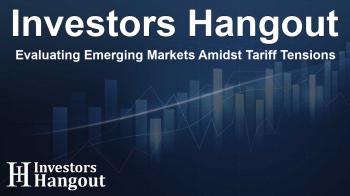Evaluating Emerging Markets Amidst Tariff Tensions

Understanding the Impact of U.S.-China Tensions
In recent months, the escalating tensions between the U.S. and China have sparked discussions about potential new tariffs and their implications. Emerging markets (EMs) could feel the repercussions more severely than China, a viewpoint shared by analysts at UBS.
Current State of Chinese Exports
Chinese export prices have sharply decreased by 18% since their peak after the pandemic, contrasting with a much smaller decline of 5% in global export prices. This substantial disinflation has strengthened the competitive edge of Chinese exports, reflected in a remarkable 38% increase in export volumes over the last five years, while global figures lag considerably at just 3%.
The Potential Effects of New Tariffs
According to the UBS analysis, if new tariffs are imposed on China, the adverse effects may ripple through other emerging economies, rather than solely impacting China. Investors and analysts are examining how these tariffs might influence various sectors within EMs, especially those that are particularly sensitive to tariff changes.
Market Valuations and Investor Sentiment
The financial markets do not seem to have fully accounted for these risks, as the equity valuations in emerging markets remain about 30% higher than in previous instances of U.S.-China trade disputes. This persistent optimism is curious, especially when considering the weak returns on equity that have been reported.
Vulnerable Industries in Emerging Markets
Specific industries within emerging markets, such as steel production, automotive, and transport infrastructure, are significantly more affected by tariffs due to their composition in EM equity indices. These sectors are at risk of suffering greater losses if protectionist measures are enacted against China.
Shifts in Trade Deficits
Another layer of complexity is introduced with the shifting U.S. trade deficits. As these gaps begin moving away from China and toward countries like Mexico, Vietnam, and Taiwan, emerging market equities may face heightened exposure to new protectionist policies initiated by U.S. lawmakers.
Investor Perspectives on Emerging Markets
While some investors express confidence that the potential risks associated with tariffs are already factored into emerging market asset prices, UBS counters this view. There is evidence suggesting that the current optimism regarding earnings growth projections, paired with narrowing credit spreads, indicates that the market may not be as prepared for these developments as some believe.
Frequently Asked Questions
What are the primary risks associated with U.S.-China tensions?
The risks primarily pertain to potential new tariffs that could impact export-driven economies, especially those in emerging markets.
How have Chinese export prices changed recently?
Chinese export prices have fallen by 18% since reaching a post-pandemic high, contributing to increased competitiveness.
What is UBS's outlook on emerging market valuations?
UBS notes that valuations in emerging markets remain about 30% above those seen during prior trade disputes, suggesting potential over-optimism.
Which sectors in emerging markets are most vulnerable?
Industries such as steel, autos, and transport are highlighted as particularly sensitive to tariff impacts due to their significant presence in EM indices.
What factors could influence future emerging market performance?
Shifts in U.S. trade deficits and the enactment of protectionist policies will likely play critical roles in future performance.
About Investors Hangout
Investors Hangout is a leading online stock forum for financial discussion and learning, offering a wide range of free tools and resources. It draws in traders of all levels, who exchange market knowledge, investigate trading tactics, and keep an eye on industry developments in real time. Featuring financial articles, stock message boards, quotes, charts, company profiles, and live news updates. Through cooperative learning and a wealth of informational resources, it helps users from novices creating their first portfolios to experts honing their techniques. Join Investors Hangout today: https://investorshangout.com/
Disclaimer: The content of this article is solely for general informational purposes only; it does not represent legal, financial, or investment advice. Investors Hangout does not offer financial advice; the author is not a licensed financial advisor. Consult a qualified advisor before making any financial or investment decisions based on this article. The author's interpretation of publicly available data presented here; as a result, they should not be taken as advice to purchase, sell, or hold any securities mentioned or any other investments. If any of the material offered here is inaccurate, please contact us for corrections.
